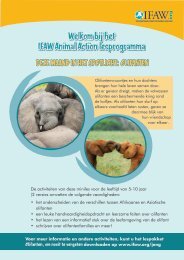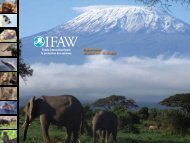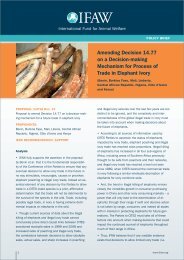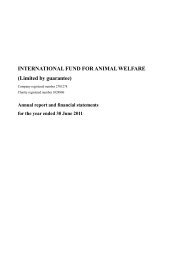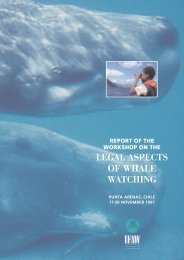Born to Be Wild - International Fund for Animal Welfare
Born to Be Wild - International Fund for Animal Welfare
Born to Be Wild - International Fund for Animal Welfare
You also want an ePaper? Increase the reach of your titles
YUMPU automatically turns print PDFs into web optimized ePapers that Google loves.
Protecting the<br />
Last <strong>Wild</strong> Tigers<br />
The problem:<br />
If current trends persist – in poaching, loss of tiger<br />
habitat and prey species and demand <strong>for</strong> tiger parts<br />
– tigers will be the first large preda<strong>to</strong>r <strong>to</strong> vanish in<br />
our lifetimes. While buying and selling tiger parts<br />
has been banned around the world <strong>for</strong> more than a<br />
decade, and law-abiding practitioners of traditional<br />
Chinese medicine (TCM) now use alternatives,<br />
an illegal trade continues <strong>to</strong> flourish. In China,<br />
commercial, industrial-scale tiger farms breed and<br />
harvest thousands of tigers in captivity, often in<br />
terrible conditions. The industry is pushing <strong>for</strong> a<br />
fully legalized trade in tiger parts.<br />
Our solution:<br />
To reverse the catastrophic decline of wild tigers, we<br />
work <strong>to</strong> protect their habitats, decrease the illegal<br />
trade in tiger parts, strengthen law en<strong>for</strong>cement, and<br />
reduce consumer demand <strong>for</strong> tiger parts.<br />
How you can help:<br />
GET INVOLVED � Encourage your<br />
government <strong>to</strong> provide support <strong>for</strong> tiger protection<br />
and habitat conservation.<br />
DONATE � Our work <strong>to</strong> protect the world’s<br />
remaining tigers depends on you. To donate go <strong>to</strong>:<br />
www.ifaw.org/donate or call 1-800-932-4329.<br />
290 Summer Street Yarmouth Port, MA 02675 800-932-4329 info@ifaw.org<br />
FAST FACTS � Over the past century, the<br />
worldwide population of tigers has plummeted from<br />
100,000 <strong>to</strong> as few as 3,000.<br />
� In the last 50 years, three sub-species of tigers<br />
have gone extinct in Asia.<br />
� There are more tigers in cages than there are in the<br />
wild. In the USA alone, between 5,000 and 10,000<br />
tigers live in captivity.<br />
� More than 5,000 tigers are held on commercial<br />
tiger farms in China and many tiger farm owners<br />
openly sell “bone nourishing <strong>to</strong>nic,” thus stimulating<br />
demand <strong>for</strong> tiger-based products.<br />
We are fighting a key battle in China. Legalization<br />
on any scale within China would be disastrous <strong>for</strong><br />
wild tigers everywhere. Legalized trade will stimulate<br />
consumer demand and encourage poaching.<br />
IFAW’s support of anti-poaching ef<strong>for</strong>ts and habitat<br />
protection has slowed the demise of tiger populations<br />
in the Russian Far East and in some of India’s<br />
protected areas. Much work remains <strong>to</strong> be done.<br />
To secure their future in the wild, tigers must be<br />
protected from poaching, de<strong>for</strong>estation and human<br />
encroachment on their habitats.







